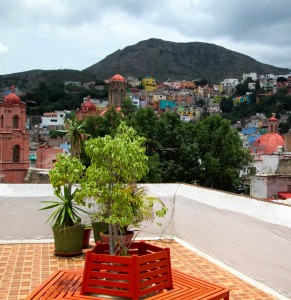When I walk down from my casa toward the Plaza de La Paz in El Centro, I pass the University of Guanajuato’s imposing main building and its impressive front steps. I imagine being a young Mexican woman, one of the roughly 20,000 students at this prestigious public university (that costs a mere $100 a semester, by the way), on her first day, looking up at those steps, and thinking: So this is what higher education looks like. I see it’s going to be a steep climb.
The students I walk past on my route, like serious university students everywhere in the world today, I’m sure, are earnest, anxious-looking young men and women, forward-leaning, with heads down, rushing to classes. Initially, I greeted them with what I’d thought was the universally requisite “Buenos dias” in the morning or “buenas tardes” in the afternoon, but they all ignored me. What, I wondered, was I doing wrong?
I asked Juan Carlos, one of the Spanish instructors at my language school, Escuela Mexicana, to enlighten me. Doesn’t everyone always greet the people they pass on the street (or, in the case here, narrow alleyways or stairways)? I asked him. Wasn’t that a given in Mexican cultural life – just as I had observed in Mali, West Africa, when I lived there in the late ‘90s — to acknowledge your fellow human beings with respectful good wishes tailored to the time of day?
“Forget the college students,” Juan Carlos said to me, waving one hand over his shoulder and wrinkling his nose. “They’re too preoccupied to follow those customs.”
I thought, but didn’t ask: Does that mean those customs will die out with their generation? If these students represent the dynamic, better-educated future of Mexico, will that future more closely resemble that of the States, where such niceties as greeting strangers on the street are (to put it mildly) rare?
“So, then,” I asked my teacher, “who do I greet? What are the rules?”
This is what I learned:
In Mexico, one always greets an elder. This is a necessary gesture of respect, because older people are universally respected.
With elders you use the formal “you” (usted), “always, with all of them,” also as a sign of respect, Juan Carlos told me. “We respect older people because they know more about everything than we do. We need to pay close attention to them.
“We try to do everything we can for old people, tambien (also), even when we don’t know them personally, like helping them with their bags or offering our seat on the bus. Out of respect.”
When I asked Juan Carlos, who is 28, grew up in Guanajuato and attended Guanajuato University, what age he considered “old,” he said, “Oh, fifties or sixties.” And when I asked the life expectancy here, he said, “about seventy or eighty.”
“There exist elderly houses in Mexico, I know,” he said. “But they are not at all common. I don’t know anyone who has put a relative in one. We care for our elders at home. Usually one of the unmarried sons or daughters of the family takes care of the old grandparent. We try to see that there are no worries for our old people.”
I ruminated on Juan Carlos’s words as I returned home from class, passing those university steps again and taking a photo of them. The scurrying students and I passed each other without acknowledgment. (Just like New York, I thought.)
Traditionally here, I learned, respect for elders begins with a simple wish for a good day, which leads, ultimately, to the assurance of relatively comfortable and secure last days. This, to me, is an enviable form of higher education, one that we Americans could surely learn from. I can only hope that this admirable and venerable tradition doesn’t pass away any time soon in modern Mexico.
A glimpse of colorful old Guanajuato from the rooftop of Escuela Mexicana:



wonderful thoughts today. It is the same in Italy…respect…
Thank you for your thoughts and comments, Sally! Great to hear from you.
sounds like Mexico treats their elders better than we do. I am so glad you are there absorbing everything
Yes, it’s an education, Ed, in so many respects. Loving it!
These kids are plain rude, sorry. Even young busy people respond to Buenos dias. Lovely views, la Bonnie, have mucha fun!!
Thank you, Te. Always great to get your point of view! — xx
That’s quite a little cultural lesson, Bonnie. Sad about the students being too preoccupied to show you some respect. I wouldn’t give up trying to reach out to them though.
Maybe they have their eyes on the “prize” of living and working in NYC one day — in which case, they’re practicing for life in that cultural milieu! 🙂
Irregardless of where or who you are…people will respond, eventually! The students you see will begin to remember you…and respond..betcha! Enjoy Bonnie, Dolores
Well, we’ll see, Dolores. Or, as they say here, vamos a ver…
I’ve noticed that young people in San Miguel don’t respond either at first, but after they’ve met you in the street a few times, they speak. Pat
That’s nice to know, Pat! Thanks.